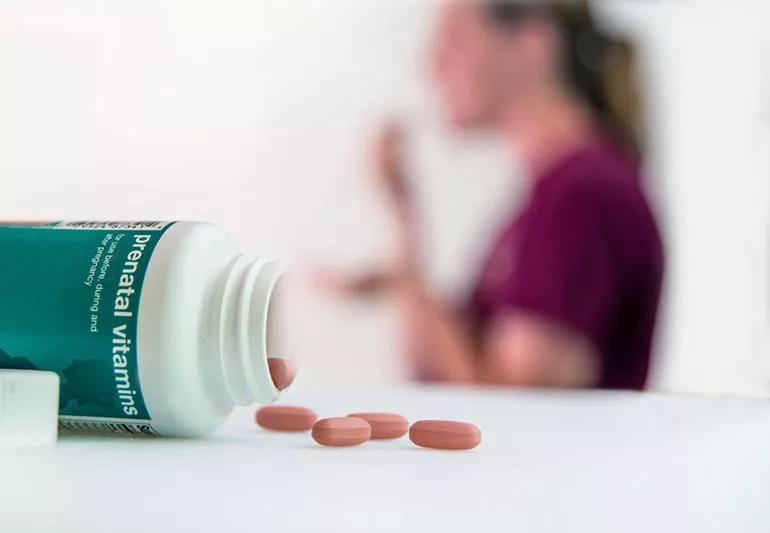The lowdown on folate, calcium, vitamin D and more

Image content: This image is available to view online.
View image online (https://assets.clevelandclinic.org/transform/d7886327-d687-43a1-b389-d711e9e9894e/prenatalVitamins-MC-070120-770x533-1_jpg)
woman taking prenatal vitamins
You load up your plate with colorful produce, lean proteins, whole grains and healthy fats. So if you’re trying to get pregnant, do you really need to take a prenatal vitamin?
Advertisement
Cleveland Clinic is a non-profit academic medical center. Advertising on our site helps support our mission. We do not endorse non-Cleveland Clinic products or services. Policy
While you should try to get your nutrients from food, even the healthiest of eaters might not get all of what they need — and when you’re growing a little one inside you, it’s good to have some backup. (Plus, that kale salad might not sound so good in a few months.)
“Prenatal vitamins can give you that extra assurance that you’re getting an adequate amount of vitamins and minerals that help make you healthy,” says certified nurse midwife Shellie Hawk, CNM.
They’re specially formulated with safe doses of key nutrients that pregnant people need. “With certain vitamins, you don’t want to overdose, so taking it in the form of a prenatal helps you make sure you’re staying in the safe range,” she says. “Should you need extra iron or folic acid, your healthcare provider will counsel you about that.”
If you’re thinking of conceiving, you’ll want to start supplementing with folic acid a few months before you start trying — and using a prenatal vitamin is a good way to do that, Hawk says.
“If you’re not going to take a prenatal ahead of time, then you should probably be supplementing with folic acid by itself,” she adds.
This B vitamin has been shown to prevent birth defects involving the brain and spine. It’s hard to get from food, so the American College of Obstetricians and Gynecologists (ACOG) recommends that all pregnant people take a daily vitamin supplement containing 400 micrograms. “Most over-the-counter prenatals have plenty of folic acid,” Hawk says. But if you’ve previously had a baby with neural tube defects, your provider may prescribe one that has more.
Advertisement
“When you're pregnant, you need calcium not only for your bones but for the development of the fetus's bones,” Hawk says. Studies have also found that supplementing with calcium during pregnancy may reduce your risk for hypertension and pre-eclampsia.
ACOG recommends that if you're age 19 and older, you should get 1,000 mg per day of calcium through food and/or supplementation.
Vitamin D helps your body absorb the calcium that builds the fetus's bones and teeth. Although we can get it from sun exposure and certain foods, most Americans do not get the recommended amount, which is about 600 IUs per day.
Vitamin B6 may help curb nausea and vomiting from morning sickness. And, Hawk says it’s even more effective when it’s combined with an antihistamine called doxylamine, which is available over the counter. The National Institutes of Health recommends getting 1.9 milligrams of B6 each day during pregnancy.
DHA is an omega-3 fatty acid that is important in fetal brain development. You can get DHA from seafood (be sure to choose varieties that are low in mercury, such as salmon, tilapia or cod) or through supplementation. Not all prenatal vitamins contain DHA; if you choose one that doesn’t, you may want to use an additional fish oil supplement, Hawk says.
Having adequate iron levels during pregnancy enables your body to carry ample amounts of oxygen to the growing fetus. Most prenatal vitamins contain the recommended 27 mg of iron, but keep in mind that your body absorbs iron better from food (such as red meat, poultry and fish) than from supplements. If you have iron-deficiency anemia, your provider will recommend additional supplementation, Hawk says.
Remember, though, you can’t supplement yourself out of a bad diet. Making good food choices during your pregnancy will help you feel as good as possible and support your baby’s future health.
Advertisement

Sign up for our Health Essentials emails for expert guidance on nutrition, fitness, sleep, skin care and more.
Learn more about our editorial process.
Advertisement
They claim to boost energy and improve longevity, but there’s currently not enough research to confirm these benefits
Certain supplements, like licorice root and St. John’s wort, can raise your blood pressure or negatively interact with medication
Properly prepared, elderberries can be a safe and healthy part of a balanced diet — just steer clear of supplements
Science doesn’t support most claims about this bee byproduct, and supplements have potential risks
The meat-based elimination diet restricts important food groups — like fruits and vegetables — that keep you healthy
Eat your fill of vitamins C, B6 and E, plus zinc and selenium
The vitamins, minerals and other nutrients in the food you eat are essential for a healthy heart, but supplements are another story
Early research shows that this supplement may help, but more studies are needed
Prioritize your health by managing stress, strengthening your social connections and getting quality sleep
Bolsters, blankets, pillows and blocks can offer extra support, stability and comfort
Allergies, postnasal drip, asthma or reflux could be to blame for a cough that won’t quit